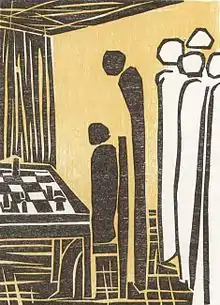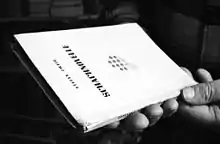The Royal Game
The Royal Game (also known as Chess Story; in the original German Schachnovelle, "Chess Novella") is a novella by the Austrian author Stefan Zweig written in 1941, the year before the author's death by suicide.[1] In some editions, the title is used for a collection that also includes "Amok", "Burning Secret", "Fear", and "Letter From an Unknown Woman".[2]
 Elke Rehder: Woodcut to the chess story The Royal Game | |
| Author | Stefan Zweig |
|---|---|
| Original title | Schachnovelle |
| Working title | The Royal Game |
| Language | German |
| Genre | Novella |
Publication date | 1943 |
Plot summary
The narrator opens the story on a passenger liner traveling from New York to Buenos Aires. One of the passengers is world chess champion Mirko Czentovic. Czentovic is a nearly illiterate and moronic peasant prodigy with no obvious redeeming qualities besides his gift for chess. The narrator plays chess with his wife, hoping to draw Czentovic's attention and engage him in a game. He draws the attention of McConnor, a businessman, who offers to pay Czentovic's fee.
A group of passengers play Czentovic, who beats them easily. They are about to lose a second game when they are interrupted by Dr B, who manages to recover them from an almost hopeless position and end the game in a draw.
Dr B tells his story to the narrator. He was a lawyer who managed the assets of the Austrian nobility and church. He was arrested by the Gestapo, who hoped to extract information from Dr B in order to steal the assets. The Gestapo kept Dr B imprisoned in a hotel, in total isolation, but Dr B maintained his sanity by stealing a book of past masters' chess games, which he learned completely. After absorbing every single move in the book, he began to play against himself, developing the ability to separate his psyche into two personas. This psychological conflict ultimately caused him to suffer a breakdown, after which he awakened in a sanatorium. A sympathetic physician attested his insanity to keep him from being imprisoned again by the Nazis, and he was finally freed.
The passengers persuade Dr B to play alone against Czentovic. Dr B agrees, but warns that he must not be allowed to play a second game. In a stunning demonstration of his imaginative and combinational powers, Dr B sensationally beats the world champion. Czentovic suggests a return game to restore his honour, and Dr B immediately agrees. But this time, having sensed that Dr B played quite fast and hardly took time to think, Czentovic tries to irritate his opponent by taking several minutes to make each move, thereby putting psychological pressure on Dr B, who gets more and more impatient as the game proceeds. His greatest power turns out to be his greatest weakness: he devolves into rehearsing imagined matches against himself repeatedly and manically. Czentovic's deliberation and placidness drive Dr B to distraction and ultimately to insanity, culminating in an incorrect statement about a check by his bishop. The narrator urges Dr B to concede the game, which awakens Dr B from his frenzy.
Historical background

Following the occupation and annexation of Austria by Nazi Germany, the country's monarchists (i.e. supporters of Otto von Habsburg as the rightful Emperor-Archduke and the rule of the House of Habsburg), conservatives as well as supporters of Engelbert Dollfuss' Austrofascist regime, were severely persecuted by the Nazis, as they were seen as opponents of the Nazi regime. Thousands of monarchists were executed or sent to concentration camps, and the pretender to the throne, Otto von Habsburg, fled to the United States, being sentenced to death in absentia by the Nazis.[3]
Adaptations
This novella was the inspiration for the 1960 Gerd Oswald film Brainwashed, originally titled Die Schachnovelle, as well as for the 1980 Czechoslovakian film Královská hra (The Royal Game).,[4] and 1963 Czechoslovakian film Šach mat.
An opera based on the novel premiered at the Kiel Opera House on 18 May 2013. The music was by Cristóbal Halffter, and the libretto by Wolfgang Haendeler.[5]
The story was the basis of the production 64 Squares from the Rhum and Clay Theatre Company presented at the Edinburgh Festival Fringe in August 2015. In this production the character "B" is played by three actors, both separately and together, assisted by a percussionist.[6]
A German/Austrian production entitled Schachnovelle (English title "The Royal Game"), released in August 2021, is an adaptation of the Stefan Zweig story as well as the Czech film "Brainwashed."[7]
References
- "A classic rediscovered: Grandmaster". The Economist. 13 December 2001. Retrieved 9 March 2015.
- Zweig, Stefan (1981). The Royal Game and Other Stories. New York: EP Dutton.
- "Fall of Austria". University of Minnesota Center for Holocaust and Genocide Survivors. Retrieved 9 March 2015.
- "Brainwashed (1960)". IMDB. Retrieved 9 March 2015.
- EvS Music Foundation, retrieved 26 June 2012
- Wicker, Tom (30 September 2014). ""Review: 64 Squares; a Game of Chess"". Exeunt Magazine.
- "Schachnovelle". IMDb.
External links
- Elke Rehder: Remarks on The Royal Game by Stefan Zweig 1942–1944 An article from 2015 with pictures on the history of Schachnovelle.
- PushkinPress.com English editions of Stefan Zweig's novellas
- Legamus.eu Audiobook version of the novella (in German)